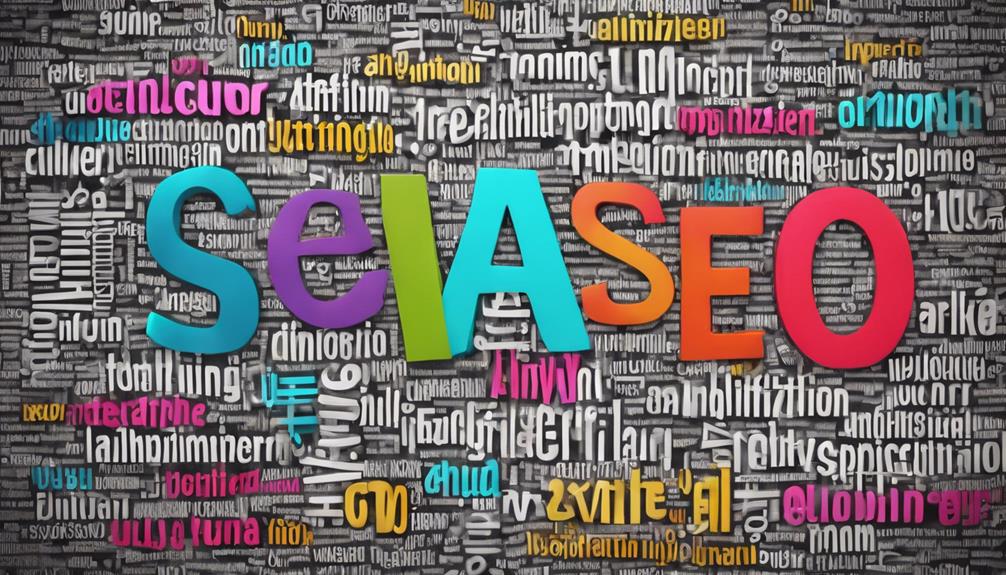In the realm of digital marketing, the intersection of artificial intelligence and search engine optimization has been a subject of growing interest. The 'Whitepaper of IITWares – Introduction of SEO With AI' offers a deep dive into the fusion of these two domains, showcasing cutting-edge strategies and methodologies that redefine traditional SEO practices.
From advanced keyword extraction using AI algorithms to the intricate analysis of ranking factors through correlation studies, this whitepaper unveils a roadmap for optimizing SEO strategies in an increasingly competitive online landscape. Explore the transformative potential of AI in SEO as this whitepaper navigates through innovative approaches that are shaping the future of digital marketing.
Word Cloud Analysis for Anchor Text Optimization

Frequently utilized in SEO strategies, word cloud analysis serves as a valuable tool for optimizing anchor text to enhance search engine visibility and rankings. By visually representing the most common words in anchor text, this analysis provides insight into the prevalent terms that can be strategically leveraged for link building and keyword targeting. The emphasis and relevance of specific words within anchor text are highlighted through word cloud analysis, enabling SEO professionals to tailor their strategies for improved search engine ranking.
The size of words within the word cloud corresponds to their frequency, offering a clear indication of key terms that should be prioritized in anchor text optimization. This method empowers SEO experts to make data-driven decisions when crafting anchor text, ultimately leading to enhanced website visibility and higher search engine rankings. Through the utilization of word cloud analysis, businesses can refine their SEO efforts, ensuring that their online content aligns with the most effective strategies for maximizing organic traffic and user engagement.
Precision and Recall in SEO Model Accuracy
Precision and recall play pivotal roles in assessing the accuracy of SEO models by measuring the identification and optimization of relevant keywords within digital content. Precision evaluates the proportion of correctly identified relevant keywords to the total predicted relevant keywords.
On the other hand, recall measures the ratio of correctly identified relevant keywords to the total actual relevant keywords. These metrics are essential in gauging the effectiveness of SEO models in recognizing and optimizing for pertinent keywords and content.
Balancing precision and recall is critical for developing high-performance SEO strategies and enhancing search engine rankings. By understanding the relationship between precision and recall, SEO practitioners can fine-tune their models to better target keywords and optimize content.
Achieving a harmony between precision and recall leads to more accurate and efficient SEO practices, ultimately improving the visibility and ranking of digital content.
Naïve Bayes for Focus Keyword Classification

In the realm of SEO optimization, Naïve Bayes classifiers leverage probability to efficiently classify focus keywords, enhancing the precision of content targeting strategies. These classifiers, including Gaussian, Multinomial, and Bernoulli models, are adept at categorizing keywords for SEO purposes. By constructing a sparse document-feature matrix, the classification of focus keywords becomes more accurate, aiding in the distinction between good and bad keywords crucial for optimizing SEO strategies effectively.
Naïve Bayes proves to be a valuable tool in the realm of SEO by helping differentiate between various types of keywords based on their rank. This classification enables marketers to tailor their content creation efforts to target specific keyword categories more effectively, ultimately contributing to improved SEO success. By utilizing Naïve Bayes algorithms, businesses can enhance their keyword targeting strategies, leading to more precise and impactful content that resonates with both search engines and target audiences.
Correlation Analysis for Ranking Factors
Correlation analysis plays a pivotal role in discerning the intricate relationships between ranking factors and website performance in the realm of SEO optimization. By utilizing tools like Pearson and Spearman correlations, SEO professionals can effectively assess the strength and direction of these relationships. This analysis is crucial as it helps uncover critical issues that may be impacting search engine results page (SERP) rankings and potential penalties.
Moreover, examining correlations between website structure, content, and categories can provide valuable insights for enhancing SEO strategies. Through the comparison of multiple websites, SEO experts can pinpoint the key factors that significantly influence search engine rankings. This approach enables them to make data-driven decisions and prioritize optimization efforts based on the most impactful factors. Ultimately, correlation analysis serves as a powerful tool in understanding the complex dynamics of SEO and enhancing overall website performance in the digital landscape.
Topic Modelling With LDA for Keyword Optimization

Drawing insights from the intricate relationships uncovered through correlation analysis, the utilization of Latent Dirichlet Allocation (LDA) stands out as a powerful tool for enhancing keyword optimization in SEO.
LDA, a widely used topic modeling technique, helps to unveil underlying themes within text data, making it particularly valuable for identifying relevant topics within a set of keywords or documents. By leveraging LDA, SEO professionals can effectively group keywords into coherent topics, thereby improving the overall relevancy and structure of website content.
Furthermore, the application of LDA facilitates the discovery of semantic associations between keywords, enabling more precise keyword clustering and targeting strategies. Implementing LDA for keyword optimization in SEO not only refines content strategy but also contributes to enhancing search engine visibility.
In essence, the strategic integration of LDA into SEO practices offers a sophisticated approach to keyword optimization, yielding tangible benefits for website performance and user engagement.
Frequently Asked Questions
How AI Can Be Used in Seo?
AI can revolutionize SEO by leveraging machine learning and NLP to analyze search patterns, enhance keyword targeting, track competitors, and automate tasks like content optimization. Insights from AI algorithms can tailor strategies for improved user engagement and conversions.
What Is SEO in Marketing?
SEO in marketing refers to the strategic process of optimizing websites to improve their visibility on search engine results pages. By incorporating techniques such as keyword research and link building, businesses can attract targeted audiences and enhance their online presence effectively.
Conclusion
In conclusion, the integration of artificial intelligence in search engine optimization techniques, as outlined in the 'Whitepaper of IITWares – Introduction of SEO With AI,' offers innovative approaches for:
- Keyword extraction
- Model evaluation
- Keyword categorization
- Ranking factor analysis
- Competitor analysis
Leveraging AI tools and techniques can significantly enhance SEO strategies in the digital landscape by:
- Optimizing keyword optimization
- Improving model accuracy
- Understanding critical ranking factors for better search engine performance.
